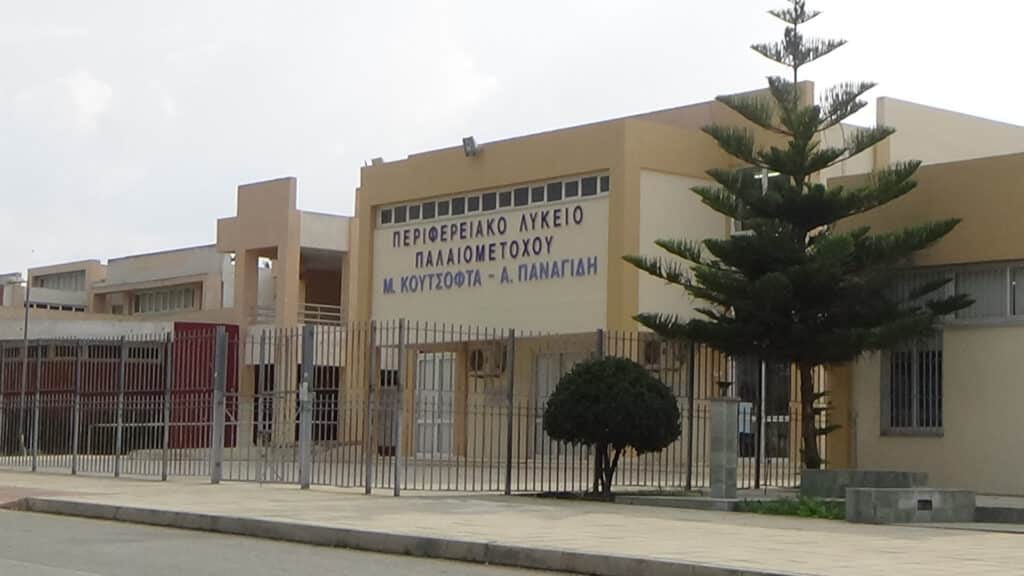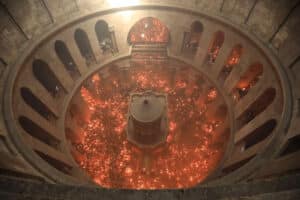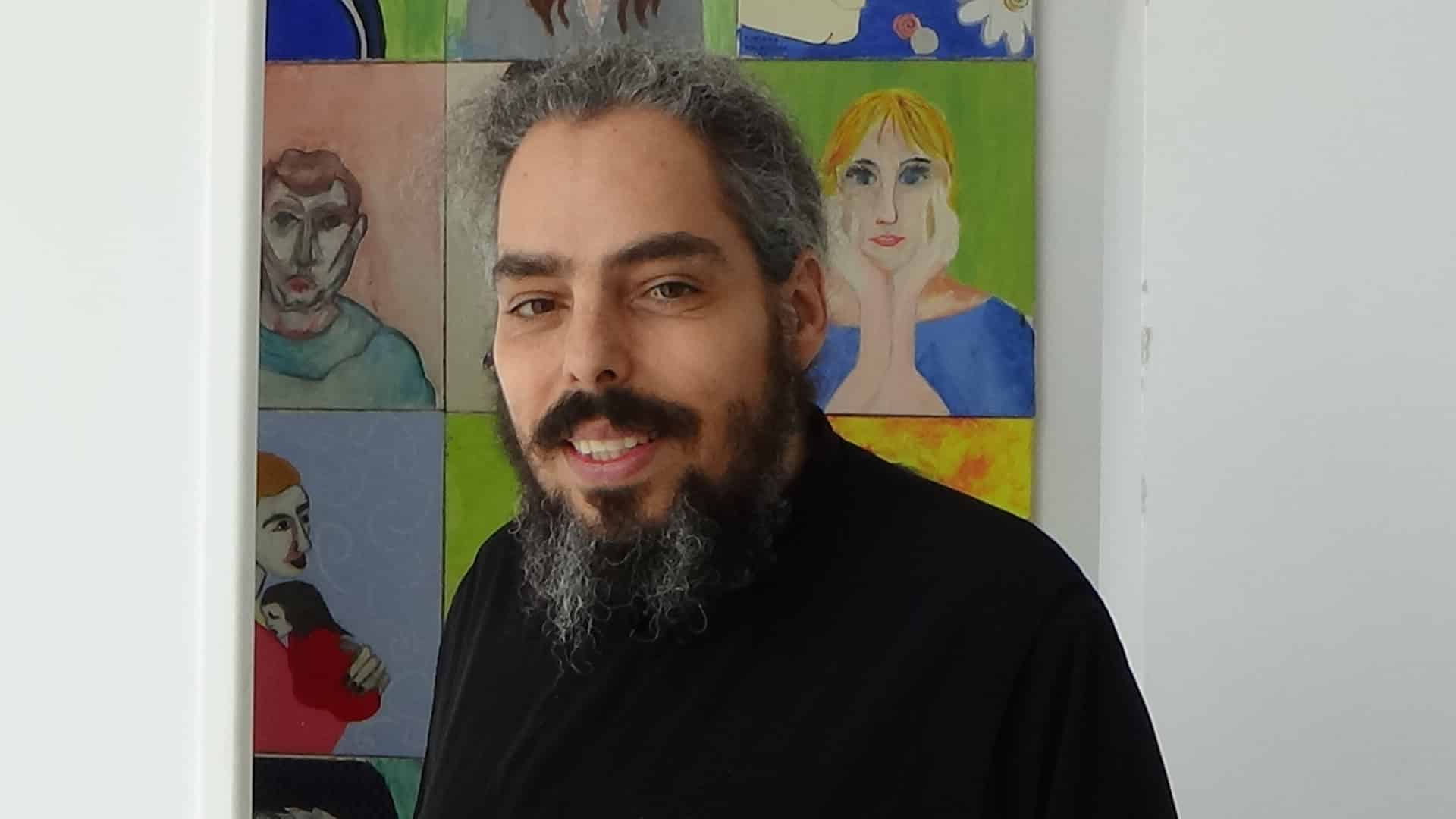In a physics teacher who is also a priest THEO PANAYIDES finds a man who believes in miracles, and that science and religion can sit side by side. He also has the serenity to feel something good can come out of chronic illness
There’s physics, and then there’s metaphysics. And never the twain shall meet, goes the conventional wisdom – but one man begs to differ, unsurprisingly since he has a foot in both camps. Achilleas Constantinides is a physics teacher at Paliometocho High School, on the outskirts of Nicosia – but he’s also, since about four years ago, Father Achilleas, a Greek Orthodox priest well-versed in the ways of metaphysics.
We meet at the school itself, a rather forbidding structure behind a high fence – though the inside is friendlier, with sunlight and courtyards and the usual inspirational aphorisms (in English, surprisingly) tacked up on the walls. ‘United in Diversity’ says one poster, next to the flags of various EU countries; ‘Happiness is not a destination, it’s a way of life’ claims another. It’s the last day of term, the school half-empty. He sits opposite me in a kind of mini-staffroom, a pale, pleasant, soft-spoken man in his priestly cassock – and in fact his pallor is also significant, betraying a body that’s never been able to produce enough red blood cells. Father Achilleas is among the 1,000 or so people in Cyprus who suffer from thalassemia, a disease that’s necessitated blood transfusions and medical care since he was a baby.
“I was lucky,” he muses softly. For a long time, regular transfusions were the only available treatment, which however overburdened the body with iron; patients invariably died young, of acute iron poisoning. In 1977, however – a year before he was born – a drug called Desferal came out, administered intravenously to remove the excess iron. On the one hand, it was a lifesaver. On the other, it meant that – starting from about a month old – Achilleas had to sleep every night with a kind of pump attached to his body, a syringe slowly releasing the medicine. The syringe is inserted in the upper arm or leg – but babies don’t have fully-developed veins yet so “we had to start from the head”, his parents holding him down while he screamed and wailed. Even now, he has to wear the pump every other day for 12 hours, and goes to hospital for a blood transfusion every two weeks.

Paliometocho High School,
These details aren’t just distressing in themselves – they also make it (even) more surprising that Achilleas should’ve entered holy orders. Did he never resent God for having made his life such a misery? Did he never wonder ‘Why me?’. “Yeah, good question,” he chuckles, and pauses. “No, I never really thought like that – though once, in high school, I went on a visit to Mount Athos [the ‘holy mountain’ in Greece] for the first time, and met a monk who said something that puzzled me. He said ‘You should thank God that you have thalassemia’.” He didn’t say anything else – monks have a habit of being cryptic – but the more the boy thought about it, the more he saw the wisdom behind the admonition.
“When a person is suffering – and I don’t just mean thalassemia, we don’t really suffer so badly, I mean other diseases too – if they look at it with an attitude of being thankful to God, they’ll actually gain so much.” After all, winks Father Achilleas, it’s well-known that God isn’t stingy: “Whatever someone goes through in the struggle of life, God rewards them, and handsomely too. Both in this life and – so we believe, as Orthodox Christians – in the next… God doesn’t want diseases, He doesn’t want what’s bad for people. Yet He allows them, because He knows something good can come of it.”
Well, all right – but he must have thought to himself at some point: ‘Why am I so unlucky?’.
He looks startled. “No. That thought never crossed my mind.”
It’s actually odd, he muses, that he studied Physics and became a physics teacher – following a sojourn at the Bank of Cyprus Oncology Centre (his Master’s was in Medical Physics) – and only then decided to join the clergy; it should really have been the other way round, after all “I’d thought of becoming a priest since I was a child”. His other dream was to be a doctor, but that was derailed by the thalassemia (he chose to stay in Cyprus, so as not to disrupt his treatment, but local universities didn’t offer medical degrees at the time) – one of the few areas where his illness got in the way, he assures me, the other being that he tires easily: “I could never do intense exercise”. Tennis was his only real sport, but he stopped a few years ago – not because of thalassemia, but because it wouldn’t do for a priest to be running around a tennis court. “I didn’t want even a single person to be shocked.”

The Holy Fire lighting up in Jerusalem
I’m a bit baffled why anyone would be shocked by that, then again there are many aspects of Father Achilleas’ life that seem slightly baffling. Can a physics teacher even be a man of the cloth? There’s a general perception – especially in secular Europe – that science and religion are incompatible, indeed that the former has now superseded the latter. Science can explain the world, we’re increasingly told; as science makes progress, answering questions that previously eluded us – on the laws of physics, evolution, medicine – we can drop religion, which is mere superstition from a less advanced age. “Yes,” he agrees when I broach the subject, “there are many physicists who are atheists”. Achilleas shrugs pleasantly: “It all depends on how you look at the way the world works”.
For him, there’s no contradiction: the more he admires the symmetry and complexity of natural systems, the more he marvels at the divine hand behind them. His logic (‘intelligent design’, basically) seems to go against the principles of the Enlightenment, then again the Enlightenment never really touched our little corner of the Middle East. He must be the only science teacher in the Christian world who’s also a priest, I venture – but in fact, just at this one school, there’s also a biology teacher who’s a priest! “We don’t have a priest teaching religious instruction,” chuckles Achilleas, “but we have one teaching physics and one biology.” The youngsters of Paliometocho are going to be puzzled if they ever read Richard Dawkins and The God Delusion.
Pupils do wonder, occasionally. He stays in his lane, he assures me, teaching physics without any theological embellishments (he’s not a theologian, in any case) – but high-schoolers are certainly old enough to spot an inconsistency in being taught about the Big Bang by the official representative of a divine creator. “They do sometimes ask about that. And I tell them these are not contradictory things – in fact, one completes the other. I myself feel more well-rounded for having some knowledge of spiritual life as well as the workings of the world, the laws that govern the physical world.”
It couldn’t happen in the UK, or northern Europe (it’d probably be deemed ‘offensive’ to those of other faiths, for one thing). Even here, at this school, Achilleas’ philosophy doesn’t entirely fit with the inspirational sayings on the walls: happiness isn’t just ‘a way of life’ to a man of faith, it’s a very specific destination. More importantly, even if a priest were to somehow teach physics at a British school, he’d certainly try to be circumspect about the mystical aspects of the faith – but Orthodoxy is much more upfront when it comes to mysticism. Father Achilleas believes in miracles, and indeed has witnessed one himself – at Mount Tabor in Israel on the Feast of the Transfiguration (this was before he became a priest), when he attended the all-night vigil at the convent there and, along with the chanting nuns, saw a thin golden thread appear in the sky. (He recalls hearing muffled exclamations among the group of nuns, and assumes they could see it too.) It’s actually not so uncommon for God to reveal Himself in this way, he adds mildly, mentioning the miracle of the Holy Fire in Jerusalem every year on Easter Saturday – though of course those party-poopers at Wikipedia claim that “the authenticity of the miracle has long been disputed”.
As a scientist, though, how does he approach such matters?
“Well, these things are metaphysical. They can’t be explained scientifically.”
But what about the notion that science can explain everything?
“Eh, no,” he smiles. “Science can’t explain these things.”
There’s something comforting about this uncomplicated certitude, the eternal yin and yang of religion vs. science resolved in a few quiet phrases – even more since it doesn’t seem to come from a place of arrogance. Achilleas Constantinides isn’t triumphant about ‘his’ side having won some supposed confrontation; there is no ‘his’ side, there’s room in his worldview for both. I suspect having lived his whole life with thalassemia, always on borrowed time, played a part in cultivating this serenity – a recognition that life is precious, that what we call the self is always subject to higher forces, and perhaps that everything can become a force for good if you look at it hard enough.
Isn’t it medical science – not God – that keeps him alive, though? “God helped the scientists to discover these medicines,” he replies, unperturbed. “Whatever human beings do, it’s always with God’s help.” Physical frailty breeds a certain humility. Had he been born a decade earlier, before treatments improved, he’d undoubtedly have died young and we wouldn’t be having this conversation. Then again, had he been born thalassemia-free, he’d probably have studied medicine and his life would be totally different now. It’s pointless to try and dissect these things.
Serene acceptance is the only answer, a personal credo where physics co-exists with metaphysics and it’s hubris to imagine we have all the answers. His life is too busy to worry about what-ifs and who-did-whats, in any case. Achilleas and his wife – a chemistry teacher, currently working in a kindergarten while waiting to be posted – have four small daughters (the eldest is eight years old), and of course there are also priestly duties adding to his workload now. That said, his routine hasn’t changed all that much. He was always involved with the church – his parents were teachers but very devout, with several priests and monks in the extended family – so he still spends the weekends helping out, but now in an official capacity. It did take a while for the girls to get used to seeing Daddy in a cassock, though.
What about free time? Will he ever just veg out and watch a movie or something? “I have no time!” he laughs. “No time at all, for anything.” He used to do a lot of painting, oils, acrylics and especially icons (no surprise that a man with an affinity for higher things should also have an artistic streak), but now there’s no way; school, church and family take up every waking hour – and that’s not even counting the hours spent on blood transfusions and pumping Desferal into his veins. Any resolutions for the new year? “To develop in my spiritual life,” he says quietly.
That, in the end, is perhaps the main takeaway from our conversation – his all-accepting outlook and (a related trait) how self-effacing he seems about himself. He’s a sinner, he declares more than once; he needs to do better. Young people today (he sees them every day in his work, of course) are good kids, he assures me, but they lack direction, they lack role models; “It’s our fault too, and mine as a priest – because my life isn’t what it should be, to set an example to my pupils.” I wonder what he means (his life sounds fairly unimpeachable) – but he wants to develop, as he says, and tells me of St Paisios, the famous ascetic who hardly ate or slept and apparently brimmed with love for everyone. Paisios had serious health issues too, like Achilleas – and perhaps that’s where it all comes together, the priesthood being his way of meeting God’s challenge, as it were, attaining some spiritual nirvana despite his fragile body.
Maybe so; or maybe he’s just a soft-spoken physics teacher with room in his heart for something beyond rational science. Meanwhile, physics itself is getting weirder – and stuff like quantum entanglement, for instance (the actual phenomenon of two sub-atomic particles intimately linked to each other despite being separated by billions of light-years of space), sounds every bit as occult and miraculous as a golden thread in the sky. “We have so much more to discover,” sighs Achilleas contentedly. Physical and metaphysical, together at last.







Click here to change your cookie preferences